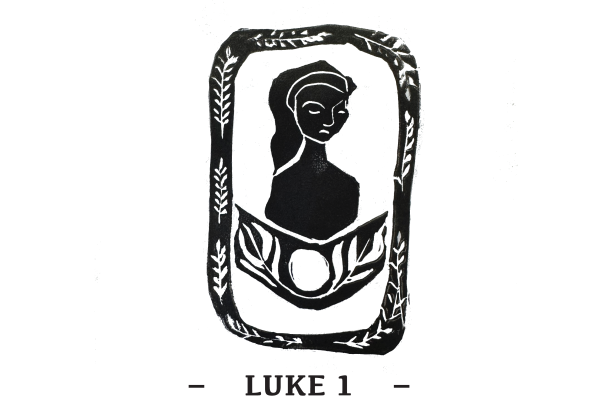
Third Thursday of Advent: Every Empty Space
In the days of Herod, king of Judea, there was a priest named Zechariah, of the division of Abijah. And he had a wife from the daughters of Aaron, and her name was Elizabeth. And they were both righteous before God, walking blamelessly in all the commandments and statutes of the Lord. But they had no child, because Elizabeth was barren, and both were advanced in years.
—Luke 1:5-7
My best friend Eve sits in her red leather armchair, surrounded by a stack of books. This nook is her retreat after long days at work, a quiet space where she can lose herself in stories and distant lands. With a hot cup of coffee, she opens a book and finds her place.
But before long, she becomes aware of a profound silence, a quiet that feels more unsettling than restful.
She looks around at the home she and her husband have built together. It feels empty. She imagines what it would be like if the house were filled with the laughter and joyful chaos of little toddlers. Instead, there is this overwhelming quiet.
The longing is too much to bear. This time last year, she lost her baby in the third trimester of her pregnancy. The grief was excruciating and sadly intensified by years of spending all she had on doctors, hoping for a miracle.
Since then, certain spaces have felt harder to enter, less safe.
Church, once a sanctuary, has become a place where grief lingers like an invisible cloud or weight. People rarely notice her sorrow, and even fewer ask her how she’s doing. She used to volunteer in the church’s Sunday school, but now each child she sees is a bittersweet reminder of the dream she holds but cannot reach.
She carries this unspoken grief with her, day by day.
My story is not the same as Eve’s, but we have some things in common. As a single woman living far away from my biological family, I too have experienced a sadness which is intensified on Sunday mornings.
At the first church I attended, I noticed that many people arrived, sat, and departed as part of their nuclear family units. When I volunteered with children’s church, I was often asked, “Which child is yours?” And when I took my friend’s children to the church’s Easter egg hunt, I was abruptly pulled aside by someone who sternly informed me that these were not my children and questioned where their parents were!
As a single person, this left me feeling like an outsider, and I wondered why we use terms like “church family” while our practices so often reflect the rhythms of biological family rather than the inclusive, spiritual family we aspire to be.
It makes me wonder how Elizabeth and Mary would fit into our church communities in 2024. I think of Elizabeth, who lived with the pain and weight of infertility most of her married life. And I think of Mary, who was likely a young teenaged mom.
When God opened Elizabeth’s womb, granting her the gift of a son, I imagine her joy. What was it like when she told people that she was with child? What was it like when she felt her son leap within her previously barren womb as he was filled with the Holy Spirit? Did her heart feel like it would burst?
And yet, that joy was not the end of her sorrow.
Elizabeth’s is a story of longing and fulfilment, but also sacrifice. Her son, John, lived a powerful life, only to meet a tragic end. In the same way, Mary’s joy at carrying the Savior of the world came with the sorrow of watching her son’s path lead to the cross.
These women experienced deep joy—but not without pain. God’s promises fulfilled, yet still unfolding.
It is a story that resonates in the lives of many who desire something deeply, yet find themselves in a season of waiting, hopelessness, unfulfilled desires, or unexpected redirection. Advent reminds us that God works in and through these times, redeeming every barren space in our lives for His purposes.
In my own life, God has used these seasons to draw me into relationships that are rich with meaning and purpose, particularly with young women I disciple. God has placed spiritual daughters in my path, and I have come to cherish this unexpected form of motherhood.
One of these students, Marie, is a diligent, passionate young woman who is eager to serve in ministry. Her enthusiasm and faith have not only given her direction, but have also reminded me of the immense privilege of nurturing others’ personal and spiritual growth. These relationships have shown me the significance of spiritual motherhood and fatherhood.
Like Elizabeth, who encouraged Mary, or Paul, who called Timothy “my dear son,” we each have the opportunity to nurture those around us and point them toward the goodness and the promises of God.
In nurturing spiritual children like Marie, I have found a calling that doesn’t erase my longing for a family, but transforms it. God can use our deepest desires in ways we may not anticipate, filling empty places with spiritual family and purpose.
This Advent, may we remember that Elizabeth’s barren womb became a place where God’s plans took root. In the pain of waiting, we find John, who points us to Jesus, and we look forward with hope to the day when all our longings will be fulfilled in Him.
—Pip K. ministers to students at the University of North Carolina.
—Luke 1:5-7
My best friend Eve sits in her red leather armchair, surrounded by a stack of books. This nook is her retreat after long days at work, a quiet space where she can lose herself in stories and distant lands. With a hot cup of coffee, she opens a book and finds her place.
But before long, she becomes aware of a profound silence, a quiet that feels more unsettling than restful.
She looks around at the home she and her husband have built together. It feels empty. She imagines what it would be like if the house were filled with the laughter and joyful chaos of little toddlers. Instead, there is this overwhelming quiet.
The longing is too much to bear. This time last year, she lost her baby in the third trimester of her pregnancy. The grief was excruciating and sadly intensified by years of spending all she had on doctors, hoping for a miracle.
Since then, certain spaces have felt harder to enter, less safe.
Church, once a sanctuary, has become a place where grief lingers like an invisible cloud or weight. People rarely notice her sorrow, and even fewer ask her how she’s doing. She used to volunteer in the church’s Sunday school, but now each child she sees is a bittersweet reminder of the dream she holds but cannot reach.
She carries this unspoken grief with her, day by day.
My story is not the same as Eve’s, but we have some things in common. As a single woman living far away from my biological family, I too have experienced a sadness which is intensified on Sunday mornings.
At the first church I attended, I noticed that many people arrived, sat, and departed as part of their nuclear family units. When I volunteered with children’s church, I was often asked, “Which child is yours?” And when I took my friend’s children to the church’s Easter egg hunt, I was abruptly pulled aside by someone who sternly informed me that these were not my children and questioned where their parents were!
As a single person, this left me feeling like an outsider, and I wondered why we use terms like “church family” while our practices so often reflect the rhythms of biological family rather than the inclusive, spiritual family we aspire to be.
It makes me wonder how Elizabeth and Mary would fit into our church communities in 2024. I think of Elizabeth, who lived with the pain and weight of infertility most of her married life. And I think of Mary, who was likely a young teenaged mom.
When God opened Elizabeth’s womb, granting her the gift of a son, I imagine her joy. What was it like when she told people that she was with child? What was it like when she felt her son leap within her previously barren womb as he was filled with the Holy Spirit? Did her heart feel like it would burst?
And yet, that joy was not the end of her sorrow.
Elizabeth’s is a story of longing and fulfilment, but also sacrifice. Her son, John, lived a powerful life, only to meet a tragic end. In the same way, Mary’s joy at carrying the Savior of the world came with the sorrow of watching her son’s path lead to the cross.
These women experienced deep joy—but not without pain. God’s promises fulfilled, yet still unfolding.
It is a story that resonates in the lives of many who desire something deeply, yet find themselves in a season of waiting, hopelessness, unfulfilled desires, or unexpected redirection. Advent reminds us that God works in and through these times, redeeming every barren space in our lives for His purposes.
In my own life, God has used these seasons to draw me into relationships that are rich with meaning and purpose, particularly with young women I disciple. God has placed spiritual daughters in my path, and I have come to cherish this unexpected form of motherhood.
One of these students, Marie, is a diligent, passionate young woman who is eager to serve in ministry. Her enthusiasm and faith have not only given her direction, but have also reminded me of the immense privilege of nurturing others’ personal and spiritual growth. These relationships have shown me the significance of spiritual motherhood and fatherhood.
Like Elizabeth, who encouraged Mary, or Paul, who called Timothy “my dear son,” we each have the opportunity to nurture those around us and point them toward the goodness and the promises of God.
In nurturing spiritual children like Marie, I have found a calling that doesn’t erase my longing for a family, but transforms it. God can use our deepest desires in ways we may not anticipate, filling empty places with spiritual family and purpose.
This Advent, may we remember that Elizabeth’s barren womb became a place where God’s plans took root. In the pain of waiting, we find John, who points us to Jesus, and we look forward with hope to the day when all our longings will be fulfilled in Him.
—Pip K. ministers to students at the University of North Carolina.
